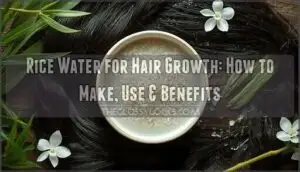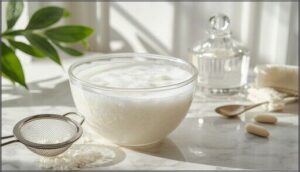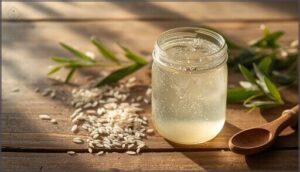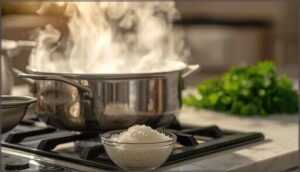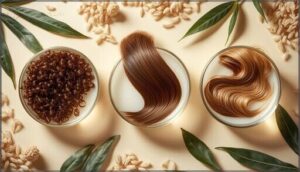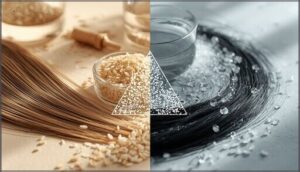This site is supported by our readers. We may earn a commission, at no cost to you, if you purchase through links.
Your grandmother might have been onto something when she saved the cloudy water left behind after rinsing rice. For centuries, women in Asian communities have used this starchy liquid as a hair treatment, and recent interest has sparked questions about whether rice water for hair growth actually works—or if it’s just another wellness trend.
From a trichological standpoint, rice water contains inositol, amino acids, and B vitamins that can penetrate the hair shaft and strengthen follicles from within. The real benefits extend beyond simple growth claims: improved elasticity, reduced breakage, and better moisture retention all contribute to healthier hair that can reach its full length potential.
Understanding how to prepare and apply rice water correctly makes the difference between seeing results and wasting your time with a bowl of starchy water.
Table Of Contents
Key Takeaways
- Rice water strengthens hair through inositol and amino acids that penetrate the shaft and reduce breakage by up to 30%, but it won’t accelerate actual growth rate—that’s determined by genetics and hormones, not topical treatments.
- Fermented rice water delivers more potent benefits than plain soaking by increasing nutrient bioavailability and supporting scalp microbiome balance, though you’ll need to watch for that mildly sour smell indicating proper fermentation.
- Your hair type dictates how often you should use rice water—fine or low-porosity hair needs it every 2-3 weeks to avoid protein overload and stiffness, while high-porosity or curly hair can handle twice-weekly applications.
- Proper storage in airtight glass containers and refrigeration extends shelf life to one week, but you’ll need to discard batches showing mold or off-putting smells to avoid scalp irritation and bacterial contamination.
Key Benefits of Rice Water for Hair
Rice water has earned its reputation in hair care for good reason. The starchy liquid contains a concentrated mix of vitamins, minerals, and amino acids that work together to address multiple hair concerns at once.
Here’s what makes rice water such a practical addition to your routine.
Rich Nutrient and Antioxidant Content
Rice water delivers a concentrated blend of nutrients your hair actually needs. You’ll find B vitamins like niacin and folic acid that boost scalp circulation, plus essential minerals including magnesium and zinc. The standout ingredient is inositol, an antioxidant that penetrates your hair shaft to protect from within.
Amino acids and fiber work together to lock in hydration while strengthening each strand. It can also strengthen hair follicles, improving the look and feel of hair.
Strengthening and Smoothing Effects
Beyond feeding your hair, fermented rice water actually restructures it. The proteins carry a positive charge that zeroes in on damaged, negatively charged spots along your hair shaft, filling weak zones through protein binding. This targeted repair improves elasticity by up to measurable degrees, letting your hair stretch and bounce back without snapping. The pH level hovers around 4.5–5.5, which seals your hair cuticle for enhanced smoothness you can feel immediately. One key benefit is that fermentation releases amino acids, which are essential for keratin synthesis.
Your hair gets multiple benefits from this simple treatment:
- Breakage reduction — Treated strands show noticeably less snapping and splitting after 30 days of consistent use
- Anti-frizz protection — The lightweight starch film shields against humidity while eliminating static
- Cuticle smoothness — Users report a shift from rough to very smooth texture classifications
- Hair strengthening — Chemical analysis confirms improved tensile strength, especially in color-treated hair
- Hair texture refinement — Inositol penetrates deep and stays put, creating lasting improvements between washes
Enhanced Hair Growth and Thickness
Stronger strands set the stage for something even more exciting: your hair may actually grow thicker and longer. Rice bran triggers growth factor upregulation in follicular cells, stimulating dermal papilla activity that governs hair volume.
The antioxidants promote follicular health by reducing oxidative stress on your scalp, while amino acids boost hair fiber strength. Though human trials are limited, rice water’s nutrient profile bolsters the entire hair growth cycle.
Improved Shine and Texture
That growth potential comes hand-in-hand with visible shine improvements. Inositol and starch coat your strands, smoothing the cuticle and boosting manageability while reducing friction by up to 30%. You’ll notice enhanced gloss as light reflects more evenly off smoother surfaces.
This cuticle smoothing also delivers texture uniformity, making hair softer and less prone to tangling—perfect for elevating your hair’s overall health and shine.
Scalp Health and Reduced Breakage
When your scalp microbiome falls out of balance, follicles struggle to thrive. Fermented rice water restores that equilibrium with prebiotic sugars and gentle acids, calming inflammation while boosting circulation to nourish hair follicles. The nutritional effects extend to your strands too—improved hair elasticity means measurably less hair breakage and better overall hair health.
- Reduces inflammatory cytokines like IL-6 and IL-8 on the scalp
- Enhances blood flow, delivering more oxygen to follicles
- Strengthens strand resilience through inositol and protein content
- Fosters beneficial scalp bacteria for long-term hair growth
How to Make Rice Water for Hair
You don’t need fancy equipment or expensive ingredients to make rice water at home. The process is straightforward, and you can choose from a few different methods depending on how much time you have and whether you want to boost the nutrient content.
Let’s walk through each approach so you can pick what works best for your routine.
Soaking Method Step-by-Step
The rice water soak method is simple and effective for most hair types. Start by measuring half a cup of white rice, jasmine, or basmati—each variety works equally well. Rinse the grains twice to remove surface impurities, then place them in a glass or BPA-free plastic bowl. Add 2 to 3 cups of water at room temperature, ensuring proper nutrient diffusion.
| Step | Action | Detail |
|---|---|---|
| 1 | Measure rice | Use ½ cup uncooked rice |
| 2 | Rinse thoroughly | Two rinses remove 98% of residues |
| 3 | Add water | 2–3 cups at room temperature |
| 4 | Soak duration | 15–30 minutes for best extraction |
| 5 | Strain and store | Press gently, transfer to airtight container |
Cover the container with a lid or clean cloth to prevent contamination during soaking. After 15 to 30 minutes, you’ll notice the water turns cloudy—that’s the starch and amino acids you’re after. Strain the mixture using a fine mesh strainer, gently pressing the rice to extract residual liquid. You should get around 350 to 400 mL of usable rice water, enough for full scalp coverage. Transfer it immediately into a clean, airtight container and refrigerate if you’re not using it right away.
Fermentation Method for Extra Benefits
If you want to realize deeper benefits, fermentation is your next step. Follow the soaking method, but instead of refrigerating immediately, leave the strained rice water at room temperature for 24 to 48 hours. You’ll notice a mildly sour smell—that’s lactic acid and probiotic activity at work.
This process boosts nutrient bioavailability, promotes scalp microbiome balance, and increases mineral content, making fermented rice water more potent for hair growth and strength.
Boiling Method Instructions
Need something faster than soaking? Boiling extracts nutrients quickly while increasing starch viscosity for better hair coating. Here’s your straightforward approach:
- Rinse half a cup of white or basmati rice variety thoroughly
- Boil in two cups of water for 10 minutes until cloudy
- Strain immediately and cool before application
This method maintains neutral scalp pH and delivers concentrated amino acids for hair growth. Use within a week when refrigerated.
Storage Tips and Shelf Life
Proper storage keeps your rice water fresh and effective. Refrigeration importance can’t be overstated—you’ll extend shelf life up to one week by storing in glass or ceramic container types.
Fermentation impact means stronger odors develop over time, so watch for spoilage signs like mold or off-putting smells.
Best practices? Make small batches, use airtight containers, and discard after seven days to get the most from your hair care benefits.
Using Rice Water in Your Hair Care Routine
Now that you’ve prepared your rice water, the next step is figuring out how to actually use it on your hair. The application method you choose can affect how well your hair absorbs the nutrients and how convenient the treatment fits into your routine.
Let’s walk through the most effective ways to incorporate rice water into your regular hair care schedule.
Rinsing Hair After Shampooing
After shampooing, pour your rice water rinse over damp hair, working it through from roots to ends. Let it sit for about 20 minutes—this application time allows the nutrients to penetrate your hair shaft while promoting hair growth.
Rinse thoroughly with warm water to guarantee complete residue removal, preventing starch buildup. Follow with conditioner to restore moisture and balance your hair’s protein levels.
Massaging Rice Water Into The Scalp
Beyond rinsing, gently massaging rice water into your scalp amplifies its benefits by boosting scalp blood flow and follicle nourishment. This technique can strengthen hair from the root while promoting hair growth stimulation through improved nutrient delivery.
Studies show regular scalp massage with fermented rice water may accelerate hair growth promotion, reduce hair loss, and provide symptom relief from dryness and irritation.
Leave-in Vs. Rinse-Out Application
Once you’ve worked rice water into your scalp, you’ll need to decide: leave it in or rinse it out? Rinse-out application suits low-porosity or fine hair, preventing protein buildup and scalp irritation while offering convenience.
Leave-in works well for high-porosity, curly types needing extended hydration duration.
Your hair care routine should match your porosity suitability—rinse-out minimizes buildup, while leave-in maximizes hair benefits and aids hair growth goals.
Frequency and Duration of Use
Choosing the right application frequency keeps your haircare routine balanced. Your hair porosity determines how often you’ll benefit from using rice water for hair growth promotion without triggering protein overload.
- Low porosity: Every 2-3 weeks prevents stiffness
- Medium porosity: Weekly treatments improve absorption
- High porosity: Twice weekly aids repair
- Treatment duration: 15-30 minutes based on fermentation strength
- Usage limits: Reduce frequency after 8 weeks to maintain gains
Routine variations matter—consistency beats intensity for hair growth and rice water success.
Tips for Different Hair Types and Needs
Not all hair types respond to rice water the same way, so you’ll want to tailor your approach based on your specific texture and condition. What works beautifully for thick, coily strands might weigh down fine hair or create buildup on already protein-rich locks.
Let’s look at how to adjust your rice water routine for curly, straight, and chemically treated hair.
Curly and Coily Hair Considerations
Curly and coily hair requires careful attention with rice water hair treatments because of protein overload risk. Your textured strands benefit from the hydration effects and improved hair elasticity, but using rice water too often can make hair stiff.
Aim for once-weekly application frequency to support scalp health and curl definition without compromising moisture balance. Dilute fermented rice water and follow with a moisturizing hair care product for best hair growth results.
Straight and Fine Hair Adjustments
If you have straight or fine hair strands, protein sensitivity means you’ll want to adjust your approach to avoid stiffness. Dilution techniques and shorter contact times protect your hair texture improvement goals without sacrificing hair thickening benefits.
Here’s how to refine rice water for fine hair:
- Dilute rice water 1:2 with plain water to reduce product formulation strength
- Apply for only 5-10 minutes instead of longer treatments
- Use scalp exfoliation weekly to prevent buildup
- Limit frequency monitoring to once every 1-2 weeks maximum
- Follow with moisturizing conditioner to balance protein levels
This measured approach promotes a thick hair appearance while preventing the brittleness that fine strands experience with overuse, keeping your hair styling routine effective.
Caring for Dry, Damaged, or Color-Treated Hair
For damaged strands dealing with brittleness or fading color, rice water offers damage repair methods without stripping dyes. Your color protection tips start with balancing protein and moisture—dry hair hydration needs careful monitoring to prevent stiffness while promoting hair shine and smoothness.
| Hair Condition | Rice Water Adjustment |
|---|---|
| Dry, porous hair | Dilute 1:3, add coconut oil |
| Chemical damage | Apply pre-shampoo for Split End Reduction |
| Color-treated | Use cooled rice water to preserve vibrancy |
| Split ends | Focus on mid-lengths to ends only |
| Protein overload | Skip rice water; use moisturizing hair care treatments |
This protein balance approach transforms your hair treatment routine, targeting hair damage with gentler application methods that respect your hair’s compromised structure.
Potential Risks and Common Misconceptions
Rice water isn’t a miracle cure-all, and using it without understanding its limitations can actually backfire. Some hair types respond differently than others, and overuse can create problems you weren’t expecting.
Let’s clear up the most common risks and myths so you know exactly what to watch for.
Build-Up and Protein Overload
Too much of a good thing can backfire. When you use rice water too often, its proteins can accumulate on your hair, causing protein overload—especially if you have low-porosity hair. Overload symptoms include stiffness, dryness, and brittleness.
Meanwhile, residue identification matters for scalp health: that starchy build-up clogs follicles and weighs hair down.
Treatment balance is key—alternate rice water with deep conditioning to maintain porosity impact and prevent hair damage.
Allergic Reactions and Sensitivities
Some people don’t react well to rice water, even when it offers known benefits for hair. Rice allergies, though more common in Asian populations (around 10% of atopic individuals), can trigger contact urticaria or scalp irritations.
Watch for these warning signs:
- Itching, redness, or swelling on your scalp or skin
- Worsening of existing dermatitis or eczema
- Flakiness or dryness after application
- Rashes from handling raw rice
- Bacterial risks from improper use or storage
Patch-test first, especially if you’re allergy-prone.
Myths About Miracle Growth and Fast Results
You’ve likely seen claims that rice water acts as a powerful hair growth agent, but the truth is more nuanced. No clinical research backs rice water as a true growth factor; hair growth rate is driven by genetics, hormones, and overall health—not topical rinses.
Rice water strengthens hair and reduces breakage, but it won’t accelerate growth—that’s determined by genetics, hormones, and overall health
| Claim | Reality |
|---|---|
| Rapid growth within weeks | Cosmetic effect limits actual change |
| Follicle stimulation | No proven hair growth factors |
| Miracle results | Traditional use context was about maintenance |
| Universal benefits | Overuse side effects include protein overload |
Using rice water for hair offers conditioning benefits, but the rice water benefits for hair lie in strengthening strands and reducing breakage, not accelerating growth.
Importance of Consistency and Realistic Expectations
Consistent application matters more than intensity when using rice water for hair. Realistic goals and patience prevent disappointment, as hair growth factors remain unchanged by topical treatments.
- Weekly use over 4-6 weeks shows strengthening effects
- Benefits focus on reduced breakage, not accelerated growth
- Adjust frequency based on your hair’s response
- Overuse causes protein buildup and brittleness
- Manage expectations: rice water complements your hair care routine, not replaces it
Frequently Asked Questions (FAQs)
Can rice water prevent or reverse gray hair?
Rice water won’t reverse gray hair. While fermentation benefits include antioxidants that may support melanocyte stimulation, clinical trial needs remain unmet.
Any darkening you see comes from starch darkening hair temporarily, not restored pigmentation.
Does rice type affect rice water effectiveness?
Think of different rice varieties as tools in a toolbox—each brings unique strengths. Starch level effects, protein content impact, and fermentation differences create growth outcome variance.
Matching your hair type to the right rice optimizes hair care results.
Can rice water replace regular shampoo completely?
You can’t swap shampoo for rice water completely. Without surfactants, rice water won’t cleanse oils or product buildup from your scalp, which can lead to scalp buildup and hygiene issues over time.
Is rice water safe during pregnancy or breastfeeding?
Topical use on your scalp appears safe, but arsenic exposure from drinking rice water warrants caution.
Assure safe preparation, watch for scalp sensitivities, and consult your healthcare provider about infant safety concerns.
Does rice water work for hair loss conditions?
Hair loss conditions like Androgenetic Alopecia, Alopecia Areata, and Telogen Effluvium require medical intervention.
While rice water offers hair benefits through follicle stimulation and reducing scalp inflammation, it isn’t a proven hair growth agent for clinical hair loss.
Conclusion
Picture a strand of hair becoming more resilient with each rinse, protected by the same tradition that’s sustained generations. Rice water for hair growth isn’t a quick fix, but consistent application strengthens follicles, reduces breakage, and creates the foundation for healthier length retention.
Your results depend on proper preparation, appropriate frequency for your hair type, and realistic expectations. The cloudy water in your bowl holds potential—what you do with it determines the outcome.
- https://onlinelibrary.wiley.com/doi/abs/10.1111/j.1468-2494.2010.00605_3.x
- https://pmc.ncbi.nlm.nih.gov/articles/PMC10083897/
- https://www.researchgate.net/publication/324179387_Rice_Water_A_Traditional_Ingredient_with_Anti-Aging_Efficacy
- https://www.derpharmachemica.com/pharma-chemica/nutritional-analysis-and-antimicrobial-activity-of-fermented-rice-water-73253.html
- https://my.clevelandclinic.org/staff/19843-shilpi-khetarpal

